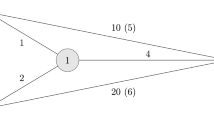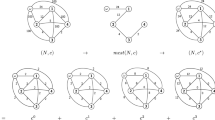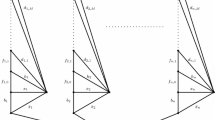Abstract
Minimum cost spanning tree (mcst) problems study situations in which agents must connect to a source to obtain a good, with the cost of building an edge being independent of the number of users. We reinterpret mcst problems as value sharing problems, and show that the folk and cycle-complete solutions, two of the most studied cost-sharing solutions for mcst problems, do not share values in a consistent way. More precisely, two mcst problems yielding the same value sharing problem might lead to value being shared in different ways. However, they satisfy a weaker version of the property that applies only to elementary problems, in which the cost on an edge can only be 0 or 1. The folk solution satisfies the version related to the public approach, while the cycle-complete solution satisfies the one related to the private approach, which differ depending if we allow a group to use the nodes of other agents or only their own nodes. We then build axiomatizations built on these properties. While the two solutions are usually seen as competitors in the private approach, the results point towards a different interpretation: the two solutions are based on different interpretations of the mcst problem, but are otherwise conceptually very close.



Similar content being viewed by others
Data availability
Data sharing not applicable to this article as no datasets were generated or analysed during the current study.
Notes
While the subscript V is not necessary, given that allocations of cost and value functions are considered in this paper, sometimes at the same time, we use the subscript to clarify what is being allocated.
Core Additivity in Values imposes that \(Core(V\left( \cdot ,c^{\prime \prime }\right) )=Core(V\left( \cdot ,c^{\prime \prime }\right) )+Core(V\left( \cdot ,c^{0}\right) ),\) which in turns implies that \(Core(V\left( \cdot ,c^{0}\right) )=0^{N}.\)
For \(S\subseteq N\backslash \left\{ i\right\}\) and each \(Q\in \mathcal {Q},\) adding agent i to S yields no extra value if i does not belong to Q or if \(S\cap Q=\emptyset .\) Otherwise, agent i adds a value of 1. Let \(\mathcal {Q}_{S}^{i}=\left\{ Q\in \mathcal {Q}\left| i\in Q,\text { }S\cap Q\ne \emptyset \right. \right\} .\) Then \(V(S\cup \left\{ i\right\} ,{\tilde{c}})-V(S,{\tilde{c}})=\left| \mathcal {Q}_{S}^{i}\right| \ge \left| \mathcal {Q}_{T}^{i}\right| =\) \(V(T\cup \left\{ i\right\} ,{\tilde{c}})-V(T, {\tilde{c}}),\) for all \(T\subset S.\)
References
Bahel E, Trudeau C (2019) A cost sharing example in which subsidies are necessary for stability. Econ Lett 185:108701
Bergantiños G, Lorenzo L, Lorenzo-Freire S (2011) A generalization of obligation rules for minimum cost spanning tree problems. Eur J Oper Res 211:122–129
Bergantiños G, Lorenzo-Freire S (2008) A characterization of optimistic weighted shapley rules in minimum cost spanning tree problems. Econ Theor 35:523–538
Bergantiños G, Vidal-Puga J (2007) A fair rule in minimum cost spanning tree problems. J Econ Theory 137:326–352
Bergantiños G, Vidal-Puga J (2007) The optimistic TU game in minimum cost spanning tree problems. Int J Game Theory 36:223–239
Bergantiños G, Vidal-Puga J (2009) Additivity in minimum cost spanning tree problems. J Math Econ 45:38–42
Bergantiños G, Vidal-Puga J (2021) A review of cooperative rules and their associated algorithms for minimum-cost spanning tree problems. SERIEs J Spanish Econ Assoc 12:73–100
Bird C (1976) On cost allocation for a spanning tree: a game theoretic approach. Networks 6:335–350
Bloch F, de Clippel G (2010) Cores of combined games. J Econ Theory 145:2424–2434
Bogomolnaia A, Moulin H (2010) Sharing the cost of a minimal cost spanning tree: beyond the folk solution. Games Econ Behav 69:238–248
Branzei R, Moretti S, Norde H, Tijs S (2004) The p-value for cost sharing in minimal cost spanning tree situations. Theor Decis 56:47–61
Dutta B, Kar A (2004) Cost monotonicity, consistency and minimum cost spanning tree games. Games Econom Behav 48:223–248
Feltkamp V, Tijs S, Muto S (1994) On the irreducible core and the equal remaining obligations rule of minimum cost spanning extension problems. Tilburg University CentER Discussion Paper 94106
Kar A (2002) Axiomatization of the Shapley value on minimum cost spanning tree games. Games Econom Behav 38:265–277
Kruskal J (1956) On the shortest spanning subtree of a graph and the traveling salesman problem. Proc Am Math Soc 7:48–50
Lorenzo L, Lorenzo-Freire S (2009) A characterization of Kruskal sharing rules for minimum cost spanning tree problems. Int J Game Theory 38:107–126
Prim RC (1957) Shortest connection networks and some generalizations. Bell Syst Tech J 36:1389–1401
Schmeidler D (1969) The nucleolus of a characteristic function game. SIAM J Appl Math 17(6):1163–1170
Shapley LS (1953) A Value for n-person Games. In: Kuhn HW, Tucker AW (eds) Contributions to the theory of games, vol II. Princeton University Press, Princeton
Tijs S, Branzei R, Moretti S, Norde H (2006) Obligation rules for msct situations and their monotonicity properties. Eur J Oper Res 175:121–134
Tijs S, Brânzei R (2002) Additive stable solutions on perfect cones of cooperative games. Int J Game Theory 31:469–474
Trudeau C (2012) A new stable and more responsive cost sharing solution for mcst problems. Games Econ Behav 75:402–412
Trudeau C, Vidal-Puga J (2017) On the set of extreme core allocations for minimal cost spanning tree problems. J Econ Theory 169(C):425–452
Trudeau C, Vidal-Puga J (2019) The Shapley value in minimum cost spanning tree problems. In: Algaba E, Fragnelli V, Sanchez-Soriano J (eds) Handbooks of the Shapley value. Taylor and Francis Group, New York
Trudeau C, Vidal-Puga J (2020) Clique games: a family of games with coincidence between the nucleolus and the Shapley value. Math Soc Sci 103:8–14
Acknowledgements
The author thanks Tamás Solymosi and participants in a Corvinus Game Theory seminar for helpful feedback. Two anonymous referees, an associate editor and editor helped improve the paper with their comments. The author gratefully acknowledges financial support by the Social Sciences and Humanities Research Council of Canada [Grant number 435-2019-0141].
Author information
Authors and Affiliations
Corresponding author
Additional information
Publisher's Note
Springer Nature remains neutral with regard to jurisdictional claims in published maps and institutional affiliations.
A Appendix: Independence of properties
A Appendix: Independence of properties
1.1 A.1 Theorem 2
The cycle-complete solution satisfies Piecewise Linearity, Symmetry and Group Independence, but fails \(C^{PUB}\)-Cost Equivalence.
\(Sh(C^{PUB})\) satisfies \(C^{PUB}\)-Cost Equivalence, Symmetry and Group Independence, but fails Piecewise Linearity (see Example 1).
Take an order \(\pi\) of N. For each \(c\in \Gamma ^{e}\) let \(y^{\pi }(N,c)\) be the extreme core allocation of \(C^{PUB}\) according to \(\pi ,\) i.e. we lexicographically maximize among core allocations according to \(\pi .\) Let \({\bar{y}}^{\pi }\) be the Piecewise-linear extension of \(y^{\pi }.\) \({\bar{y}} ^{\pi }\) satisfies \(C^{PUB}\)-Core Equivalence, Piecewise Linearity and Group Independence but fails Symmetry.
For each \(c\in \Gamma\) let \(y^{eq}(N,c)\) be such that \(y_{i}^{eq}(N,c)= \frac{C^{PUB}(N,c)}{|N|}\) for all \(i\in N.\) \(y^{eq}\) satisfies \(C^{PUB}\)-Core Equivalence, Piecewise Linearity and Symmetry but fails Group Independence.
1.2 A.2 Theorem 3
The folk solution satisfies Piecewise Linearity, Symmetry, Core Selection but not Core Additivity in Values.
The permutation-weighted average of extreme core allocations of C satisfies Core Additivity in Values, Symmetry and Core Selection but not Piecewise Linearity.
Take an order \(\pi\) of N. For each \(c\in \Gamma ^{e}\) let \(x^{\pi }(N,c)\) be the extreme core allocation of C according to \(\pi ,\) i.e. we lexicographically maximize among core allocations according to \(\pi .\) Let \({\bar{x}}^{\pi }\) be the Piecewise-linear extension of \(y^{\pi }.\) \({\bar{x}} ^{\pi }\) satisfies Core Additivity in Values, Piecewise Linearity and Core Selection but not Symmetry.
Take an order \(\pi\) of N. For each \(c\in \Gamma ^{e}\) let \(z^{\pi }(N,c)\) be the extreme core allocation of C according to \(\pi ,\) taking into account symmetry, i.e., with the constraint that if i, j are symmetric in c, \(z_{i}^{\pi }=z_{j}^{\pi }.\) Let \({\bar{z}}^{\pi }\) be the piecewise linear extension of \(z^{\pi }.\) \({\bar{z}}^{\pi }\) satisfies Piecewise Linearity, Core Selection and Symmetry but not Core Additivity in Values. To see that Core Additivity in Values fails, consider a 4-player example with \(c_{01}=c_{02}=c_{13}=c_{23}=c_{34}=0\) and \(c_{e}=1\) otherwise. Consider an order \(\pi\) such that 3 has priority over 4. Then \(z^{\pi }(N,c)=(0,0,-1,1),\) as agents 3 and 4 are not symmetric in c.
Consider \(c^{\prime }\) such that \(c_{01}^{\prime }=c_{02}^{\prime }=c_{13}^{\prime }=c_{23}^{\prime }=0\) and \(c_{e}^{\prime \prime }=1\) otherwise. Then \(z^{\pi }(N,c^{\prime })=(0,0,0,1).\)
Consider \(c^{\prime \prime }\) such that \(c_{34}^{\prime \prime }=0\) and \(c_{e}^{\prime \prime }=1\) otherwise. Then \(z^{\pi }(N,c^{\prime \prime })=(0,0, \frac{1}{2},\frac{1}{2})\) as 3 and 4 are symmetric in \(c^{\prime \prime }.\)
Notice that \(Core(V\left( \cdot ,c\right) )=Core(V\left( \cdot ,c^{\prime }\right) )+Core(V\left( \cdot ,c^{\prime \prime }\right) ).\) But we have that \(C(\left\{ i\right\} ,c)-z_{i}^{\pi }(N,c)=1--1=2,\) while \(C(\left\{ i\right\} ,c^{\prime })-z_{i}^{\pi }(N,c^{\prime })+C(\left\{ i\right\} ,c^{\prime \prime })-z_{i}^{\pi }(N,c^{\prime \prime })=1-0+1-\frac{1}{2}= \frac{3}{2},\) and thus Core Additivity in Values fails.
Rights and permissions
Springer Nature or its licensor (e.g. a society or other partner) holds exclusive rights to this article under a publishing agreement with the author(s) or other rightsholder(s); author self-archiving of the accepted manuscript version of this article is solely governed by the terms of such publishing agreement and applicable law.
About this article
Cite this article
Trudeau, C. Minimum cost spanning tree problems as value sharing problems. Int J Game Theory 52, 253–272 (2023). https://doi.org/10.1007/s00182-022-00818-z
Accepted:
Published:
Issue Date:
DOI: https://doi.org/10.1007/s00182-022-00818-z




